Mitisha Gaur at Digital Legal Talks and LawTomation Days
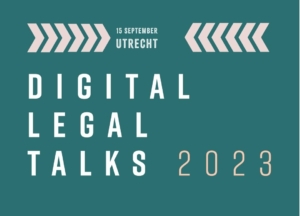 Mitisha Gaur, ESR with the LeADS Project, recently presented at Digital Legal Talks which took place on the 15th of September in Utrecth, NL. Mitisha is researching predictive justice applications deployed across courts and government bodies to augment and support decision making practices as well as how such predictive justice systems interact within the legal and regulatory ecosystem. The presentation was titled Predictive Justice and human oversight under the EU’s proposed Artificial Intelligence Act. The presentation was focused on the provisions of the EU’s draft AI Act dealing with human oversight requirements.
Mitisha Gaur, ESR with the LeADS Project, recently presented at Digital Legal Talks which took place on the 15th of September in Utrecth, NL. Mitisha is researching predictive justice applications deployed across courts and government bodies to augment and support decision making practices as well as how such predictive justice systems interact within the legal and regulatory ecosystem. The presentation was titled Predictive Justice and human oversight under the EU’s proposed Artificial Intelligence Act. The presentation was focused on the provisions of the EU’s draft AI Act dealing with human oversight requirements. 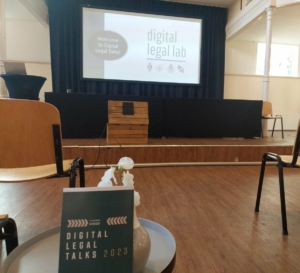 The presentation delved into an analysis of the human oversight requirements while detailing the material gaps in the human oversight strategy adopted by the draft AI Act. Finally, a specific plan focused on ensuring human oversight across 4 primary stakeholders namely (1) Developers of AI systems; (2) Deployers of AI Systems; (3) Users of the AI System and; (4) the Impact Population on whom the computational results of the AI system are applied was shared.
The presentation delved into an analysis of the human oversight requirements while detailing the material gaps in the human oversight strategy adopted by the draft AI Act. Finally, a specific plan focused on ensuring human oversight across 4 primary stakeholders namely (1) Developers of AI systems; (2) Deployers of AI Systems; (3) Users of the AI System and; (4) the Impact Population on whom the computational results of the AI system are applied was shared.
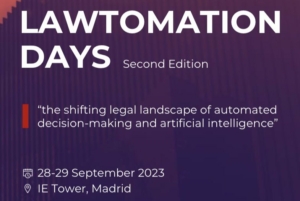 Subsequently on the 29th of September, Mitisha also presented her work at the LawTomation Days 2023 Conference organised by the IE Law School. The presentation titled Regulating Algorithmic Justice Applications under the EU’s proposed Artificial Intelligence Act: A Critical Analysis took a panoramic view of the provisions of the draft AI Act which are applicable to the high-risk AI systems (which includes predictive justice systems) as classified under the draft AI Act. The presentation was oriented around discussing the various compliance requirements, specifically for predictive justice application and whether they are adequate to allow for predictive justice systems being developed and deployed for perform or augment functions on behalf of public authorities and judicial bodies. The core discussion revolved around the provisions pertaining to risk management systems, fundamental rights impact assessment, transparency and provision of information, human oversight, accuracy-robustness and cybersecurity and finally the obligations of deployers of high-risk AI systems.
Subsequently on the 29th of September, Mitisha also presented her work at the LawTomation Days 2023 Conference organised by the IE Law School. The presentation titled Regulating Algorithmic Justice Applications under the EU’s proposed Artificial Intelligence Act: A Critical Analysis took a panoramic view of the provisions of the draft AI Act which are applicable to the high-risk AI systems (which includes predictive justice systems) as classified under the draft AI Act. The presentation was oriented around discussing the various compliance requirements, specifically for predictive justice application and whether they are adequate to allow for predictive justice systems being developed and deployed for perform or augment functions on behalf of public authorities and judicial bodies. The core discussion revolved around the provisions pertaining to risk management systems, fundamental rights impact assessment, transparency and provision of information, human oversight, accuracy-robustness and cybersecurity and finally the obligations of deployers of high-risk AI systems.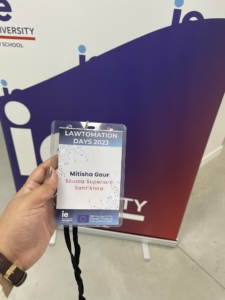






 Maciej Zuziak (ESR 6), Onntje Hinrichs (ESR 13), and Aizhan Abdrasulova (ESR 12) are the authors of the paper “Data Collaboratives with the Use of Decentralised Learning – an Interdisciplinary Perspective on Data Governance”. The paper constitutes a collaboration across three different LeADS Crossroads, i. e. Privacy vs Intellectual Property (Onntje) Data ownership (Aizhan) and Empowering Individuals (Maciej) as well as across disciplines: whereas Onntje and Aizhan focused their research on questions related to data ownership and how conflicted interests in data can be resolved, Maciej is examining various methods of distributed learning.
Maciej Zuziak (ESR 6), Onntje Hinrichs (ESR 13), and Aizhan Abdrasulova (ESR 12) are the authors of the paper “Data Collaboratives with the Use of Decentralised Learning – an Interdisciplinary Perspective on Data Governance”. The paper constitutes a collaboration across three different LeADS Crossroads, i. e. Privacy vs Intellectual Property (Onntje) Data ownership (Aizhan) and Empowering Individuals (Maciej) as well as across disciplines: whereas Onntje and Aizhan focused their research on questions related to data ownership and how conflicted interests in data can be resolved, Maciej is examining various methods of distributed learning.


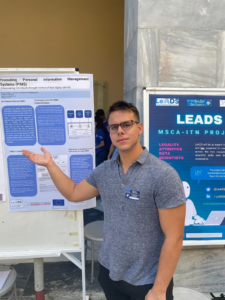 The WoPa titled “From Data Governance by Design to Data Governance as a Service” is a result of collaborative work between three ESRs from the LeADS project, Armend Duzha (ESR10) and Christos Magkos (ESR11) from University of Piraeus Research Centre (UPRC), and Louis Sahi (ESR2) from University of Toulouse III (UT3), under the supervision of Dr Manolis Alexakis from UPRC and Dr Ali Mohamed Kandi from UT3. Hence, it was designed and conceptualized as a multidisciplinary work, spanning from data processing and management to security and privacy-preservation areas. This is directly related to the research topics of the ESR fellows involved, but most importantly the study carried out as part of the Crossroads (ESRs 10 and 11 are part of Crossroad 4 “Empowering Individuals” while ESR 2 is part of Crossroad 2 “Trust”). Specifically, during the second iteration of the Crossroads, a more in-deep analysis of the state of the art and assessment of existing methods were conducted first individually and then shared among the teams.
The WoPa titled “From Data Governance by Design to Data Governance as a Service” is a result of collaborative work between three ESRs from the LeADS project, Armend Duzha (ESR10) and Christos Magkos (ESR11) from University of Piraeus Research Centre (UPRC), and Louis Sahi (ESR2) from University of Toulouse III (UT3), under the supervision of Dr Manolis Alexakis from UPRC and Dr Ali Mohamed Kandi from UT3. Hence, it was designed and conceptualized as a multidisciplinary work, spanning from data processing and management to security and privacy-preservation areas. This is directly related to the research topics of the ESR fellows involved, but most importantly the study carried out as part of the Crossroads (ESRs 10 and 11 are part of Crossroad 4 “Empowering Individuals” while ESR 2 is part of Crossroad 2 “Trust”). Specifically, during the second iteration of the Crossroads, a more in-deep analysis of the state of the art and assessment of existing methods were conducted first individually and then shared among the teams.


 In their working paper on “Data Access and Re-Use in the European Legal Framework for Data, from the GDPR to the Proposed Data Act: The Case of Vehicle Data” ESRs Tommaso Crepax, Mitisha Gaur, and Barbara Lazarotto explore the topic of data access and portability of vehicles’ black boxes, which are electronic data recorders that record a vehicle’s speed, breaking, and other information in the event of a crash. The paper centers the analysis on three main stakeholders: consumers, the public sector, and insurance companies, each having a distinct interest in data. It identifies a number of legal enablers and blockers that could affect data access and portability. The topic of this paper is closely related to the individual topics of the ESRs since it covers topics such as data sharing, access, and portability between
In their working paper on “Data Access and Re-Use in the European Legal Framework for Data, from the GDPR to the Proposed Data Act: The Case of Vehicle Data” ESRs Tommaso Crepax, Mitisha Gaur, and Barbara Lazarotto explore the topic of data access and portability of vehicles’ black boxes, which are electronic data recorders that record a vehicle’s speed, breaking, and other information in the event of a crash. The paper centers the analysis on three main stakeholders: consumers, the public sector, and insurance companies, each having a distinct interest in data. It identifies a number of legal enablers and blockers that could affect data access and portability. The topic of this paper is closely related to the individual topics of the ESRs since it covers topics such as data sharing, access, and portability between